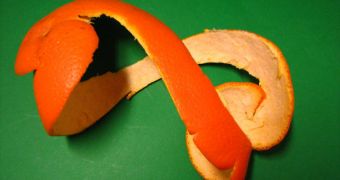Scientists have recently managed a new breakthrough in biofuel research that could see a major focus shift from fossil fuel to renewable energy being achieved. The team, based at the University of Central Florida (UCF), developed a method of turning orange peels, newspapers and other discarded, renewable items into a source of potent biofuel. The new compounds could be used to power the world's vehicles, and help fight the effects of pollution, global warming and climate change.
“This could be a turning point where vehicles could use this fuel as the norm for protecting our air and environment for future generations,” UCF Professor Henry Daniell, who has been the leader of the new investigation, says. He and his group found a way of producing ethanol from household disposables that was both cheaper and more efficient than any other method. The final goal of this long-term work is to see gasoline degraded as a second-choice fuel, after renewable ethanol. This could be made possible by the wide range of materials the new technology accepts, including sugarcane, switchgrass and straw.
The basic operating principle of the method is relatively straightforward. The team utilizes enzyme cocktails – all derived from plants – to decompose orange peels, newspapers, as well as other waste materials, to produce basic sugar. This is then fermented to produce large amounts of ethanol, which can be used as a fuel in a variety of vehicles. The most amazing thing is that the method produces very little greenhouse-gas (GHG) emissions, unlike, for example, fermenting corn starch to produce the same type of ethanol. The new approach is therefore more environmentally friendly than any other as well.
“Dr. Henry Daniell's team's success in producing a combination of several cell wall degrading enzymes in plants using chloroplast transgenesis is a great achievement,” Michigan State University Professor of Crop and Soil Sciences Mariam Sticklen says of the work. The study was made possible by funding from the US Department of Agriculture, and details of the achievement are published in the February issue of the highly regarded Plant Biotechnology Journal.

 14 DAY TRIAL //
14 DAY TRIAL //